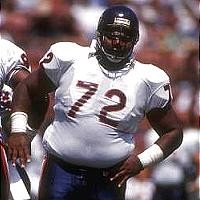
This is Navel Gazing but we also stare at heads, particularly the ones enveloping the brains of NFL players examined by Dr. Daniel G. Amen, the Newport Beach psychiatrist and brain-imaging researcher who strongly advocates better rules and helmets to protect noggins.
But Amen's latest research also looks at the brutes' waistlines, which reveals something the good doctor calls “The Dinosaur Syndrome.” As in, “Big body. Little brain. Become extinct.”
]
According to a study the Amen Clinics founder publishes online this week in Translational Psychiatry, obesity among football players is a risk factor for neurodegenerative disease and has been shown to adversely affect cognitive function. Since pros of all shapes and sizes are more exposed to repetitive concussions, they are already at a heightened risk for cognitive impairment, as Amen's work has previously shown.

His team investigated the effects of being overweight, as measured by waist-to-height ratio on brain blood flow using brain single-photon emission computed tomography (SPECT) imaging in 38 healthy weight and 38 overweight active and retired NFL players. The results showed overweight players had significant levels of decreased blood flow in the attention, reasoning and judgment parts of the brain. They also displayed impairments in attention and memory on cognitive tests.
“Obesity is a critical problem to address for brain health reasons, as
well as all of the other reasons we know about, such as heart disease,
diabetes, hypertension and cancer,” says Amen in a statement from his clinics. “In previous published
research studies, we've shown playing football can lead to brain-health
problems, including dementia, memory loss, aggression, and depression.
Symptoms may appear early, or decades after injury.”
This is the 12th scientific study to show a connection between obesity and decreased brain size or function but the first to examine football players, according to Amen, who does add there is hope for sufferers of The Dinosaur Syndrome–in the form of weight management and supplements.
“In another study we published last year, we were able to demonstrate high levels of improvement in brain health and symptoms such as memory and mood, when players engaged in a brain healthy program that included weight loss, if needed, simple supplements, exercise and a proper diet,” Amen explains. “That was the most exciting part of the study. We demonstrated that even if you have been bad to your brain, on the right program you can often reverse the damage and improve your life.”
His clinics claim to have performed more than 70,000 brain SPECT scans on patients from 90 countries, and besides NFL players patients have included NHL players, who face the same issues when it comes to exposing their brains to injury and, one assumes, putting on the pounds.
Previous coverage:

OC Weekly Editor-in-Chief Matt Coker has been engaging, enraging and entertaining readers of newspapers, magazines and websites for decades. He spent the first 13 years of his career in journalism at daily newspapers before “graduating” to OC Weekly in 1995 as the alternative newsweekly’s first calendar editor.

